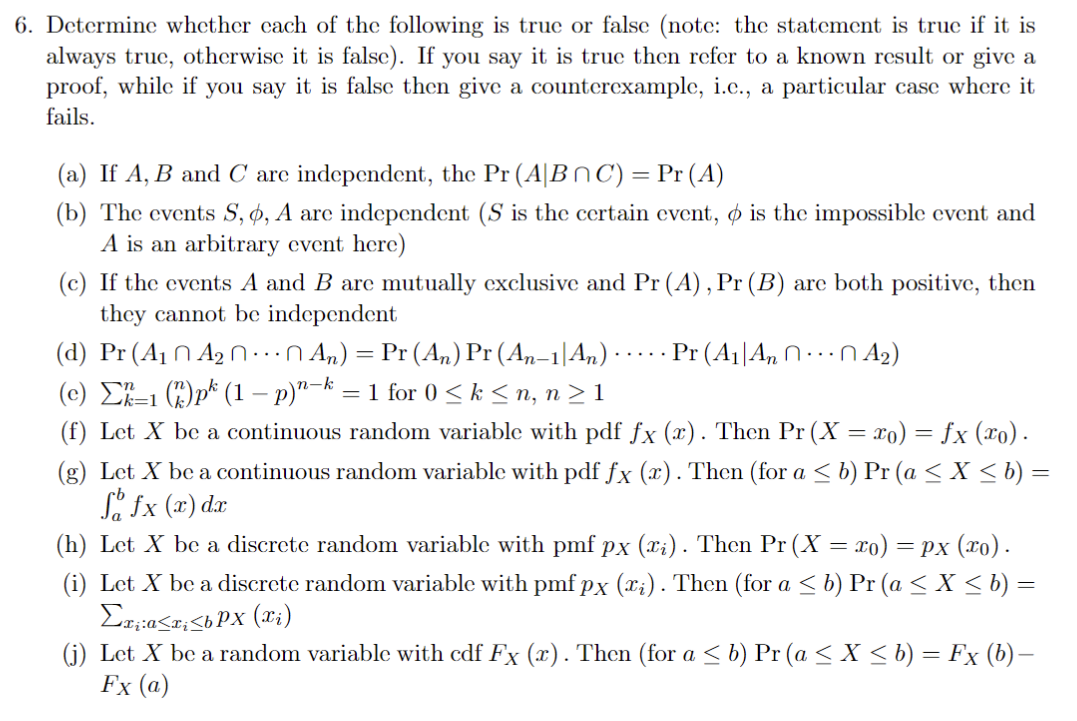Home /
Expert Answers /
Statistics and Probability /
f-j-please-determine-whether-each-of-the-following-is-true-or-false-note-the-statement-is-true-pa666
(Solved): f - j please Determine whether each of the following is true or false (note: the statement is true ...
f - j please
Determine whether each of the following is true or false (note: the statement is true if it is always true, otherwise it is false). If you say it is true then refer to a known result or give a proof, while if you say it is false then give a counterexample, i.c., a particular case where it fails. (a) If \( A, B \) and \( C \) are independent, the \( \operatorname{Pr}(A \mid B \cap C)=\operatorname{Pr}(A) \) (b) The events \( S, \phi, A \) are independent ( \( S \) is the certain event, \( \phi \) is the impossible event and \( A \) is an arbitrary event here) (c) If the events \( A \) and \( B \) are mutually exclusive and \( \operatorname{Pr}(A), \operatorname{Pr}(B) \) are both positive, then they cannot be independent (d) \( \operatorname{Pr}\left(A_{1} \cap A_{2} \cap \cdots \cap A_{n}\right)=\operatorname{Pr}\left(A_{n}\right) \operatorname{Pr}\left(A_{n-1} \mid A_{n}\right) \cdots \cdots \operatorname{Pr}\left(A_{1} \mid A_{n} \cap \cdots \cap A_{2}\right) \) (c) \( \sum_{k=1}^{n}\left(\begin{array}{l}n \\ k\end{array}\right) p^{k}(1-p)^{n-k}=1 \) for \( 0 \leq k \leq n, n \geq 1 \) (f) Let \( X \) be a continuous random variable with pdf \( f_{X}(x) \). Then \( \operatorname{Pr}\left(X=x_{0}\right)=f_{X}\left(x_{0}\right) \). (g) Let \( X \) be a continuous random variable with pdf \( f_{X}(x) \). Then (for \( \left.a \leq b\right) \operatorname{Pr}(a \leq X \leq b)= \) \( \int_{a}^{b} f_{X}(x) d x \) (h) Let \( X \) be a discrete random variable with \( \operatorname{pmf} p_{X}\left(x_{i}\right) \). Then \( \operatorname{Pr}\left(X=x_{0}\right)=p_{X}\left(x_{0}\right) \). (i) Let \( X \) be a discrete random variable with pmf \( p_{X}\left(x_{i}\right) \). Then (for \( \left.a \leq b\right) \operatorname{Pr}(a \leq X \leq b)= \) \( \sum_{x_{i}: a \leq x_{i} \leq b} p_{X}\left(x_{i}\right) \) (j) Let \( X \) be a random variable with \( c \operatorname{df} F_{X}(x) \). Then (for \( \left.a \leq b\right) \operatorname{Pr}(a \leq X \leq b)=F_{X}(b)- \) \( F_{X}(a) \)
Expert Answer
ANSWER: (f) For a continuous distribution, probability at a speicifc point is always zero. So Hence, it is false. (j) It should be for disc
